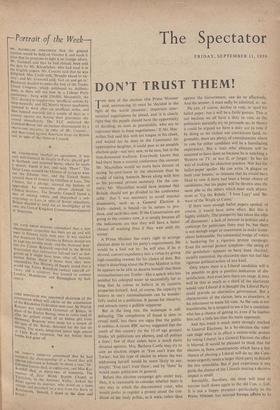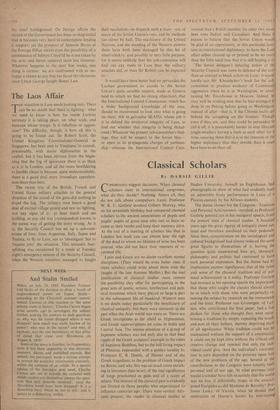DON'T TRUST THEM!
HE date of the election (the Prime Minister Tsaid, announcing it) must be 'decided in the light of the world situation'; important inter- national negotiations lie ahead, and 'it is clearly right-that the people should have the opportunity of deciding, as soon as practicable, who are to represent them in these negotiations.' If Mr. Mac- millan had said this with his tongue in his cheek, and waited (as he does in the Commons) for appreciative laughter, it could pass as an amiable election quip—not very new, to be sure, but in the time-honoured tradition. Everybody knows that had there been a summit conference this summer Mr. MacMillan would no more have dreamt of saying by-your-leave to the electorate than he would of taking Aneurin Bevan along with him as his personal private secretary. On the con- trary, Mr. Macmillan would have insisted that Britain should not go divided to the conference table : that it was necessary to avoid internal dissensions, such as a General Election is likely—indeed, is bound—in its nature to pro- duce, and such-like cant. If the Conservatives are going to the country now, it is simply because all the indications are that they will have a better chance of winning than if they wait until the
winter. A Prime Minister has every right to arrange election dates to suit his party's requirements. He would be a fool not to: he will also, if he is shrewd, convert expediency into a virtue by giving high-sounding reasons for his choice of date. But what is disturbing about the Prime Minister is that he appears to be able to deceive himself that these rationalisations are Truths—like a quack who has peddled his coloured water so successfully for so long that he comes to believe in its curative properties himself. And, of course, the capacity to believe in one's rationalisations can be wonder- fully useful to a politician. It passes for sincerity, and attracts many a gullible supporter. But in the long run, the technique is self- defeating. The complexion of fraud is slow to reveal itself, but there are signs that the public is restless. A recent BBC survey suggested that the youth of this country (in the 15-19 age groups) thinks 'all politicians are phoney, and all politics a bore'; few of their elders have a much more elevated opinion. Mrs. Barbara Castle may try to coin an election slogan in 'You can't trust the Tories'; but the type of elector to whom she was addressing herself would be more likely to say, simply, 'You can't trust them'; and by 'them' he would mean politicians in general.
Before this election campaign gets under way, then, it is reasonable to consider whether there is any way in which the discontented voter, who would prefer to register a protest about the con- dition of the body politic, as it were, rather than against the Government, can do so effectively. And the answer, it must sadly be admitted, is : no.
He can, of course, decline to vote, or spoil his ballot paper; but it will be a futile gesture. This is not because we all have a duty to vote, as the politicians naturally try to persuade us; in theory it could be argued we have a duty not to vote if by doing so we violate our convictions (and, re- grettably, there are plenty of constituencies where to vote for either candidate will be a humiliating experience). But a man who abStains will be assumed to have done so because he is watching a Western on TV, or was ill, or forgot : he has no way of making his objection positive. Nor has the ballot-paper spoiler. He can write 'A plague on both your houses,' or intimate that he would have liked to vote if there had been a better choice of candidates; but his paper will be thrown into the same pile as the others which bear such abjura- tions as 'Up the Rebels,' I love Lucy' and 'Be- ware of the Wrath to Come.'
If there were enough ballot papers spoiled, of course, it would have some effect. But this is highly unlikely. The prosperity has taken the edge off discontent : a lack of interest in politics and a contempt for politicians there may be, but there is not enough anger or resentment to make icono- clasm fashionable. No substantial wedge of voters is hankering for a vigorous protest campaign. Even the normal protest symptom—the swing of the pendulum—appears to have been checked; socially contented, the electorate does not feel like vigorous political action of any kind. Only where there is a Liberal candidate will it be possible to give a positive indication of dis- satisfaction. And even here there are snags. It may well be that as much as a third of the electorate would vote Liberal if it thought the Liberal Party could provide an alternative government. But a characteristic of the elector, here as elsewhere, is his reluctance to waste his vote. As the vote is not transferable, he is tempted to use it for a candidate who has a chance of getting in, even if he loathes him only a little less than his main opponent. And this trend is much more strongly marked in General Elections. In a by-election the voter can stage what is in effect a nation-wide protest by voting Liberal; in a General Election the effect is blurred. It would be pleasant to think that the electors in those constituencies which have a fair chance of electing a Liberal will do so; the Com- mons urgently needs a larger third party to disturb the two monoliths. But if past experience is any guide the chance of the Liberals making a decisive impact is small. Inevitably, therefore, the issue will tend to narrow itself down again to the old Con. v. Lab. It is not a happy prospect—particularly as- the Prime Minister has selected foreign affairs to be the chief battleground. On foreign affairs the record of the Government has been so disgraceful that it becomes very hard to contemplate lending it support; yet the prospect of Aneurin Bevan at the Foreign Office makes even the possibility of a continuance of Selwyn Lloyd (if he is not taken by the arm, and thrust upstairs) seem less tiresome. Whatever happens in the next few weeks, one thing is certain : we arc confronted with as un- happy a choice as any that has faced the electorate since Lloyd George fought Bonar Law.



































 Previous page
Previous page